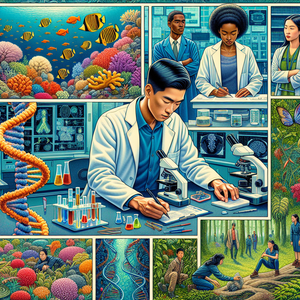Reimagining Organisms Through Synthetic Biology

The strides made in synthetic biology are largely due to advancements in genetic engineering techniques, allowing for precise manipulation of DNA. This has paved the way for creating organisms with functions that are both novel and beneficial. One of the most profound examples of this is the engineering of bacteria to produce insulin. Traditionally, insulin was extracted from animal pancreases, a method that was not only costly but also inefficient. Synthetic biology has made it possible to produce insulin in a more cost-effective manner, significantly enhancing its accessibility for diabetics around the globe. This is a testament to how synthetic biology can revolutionize the production of essential medicines, making them more affordable and widely available. In the agricultural sector, synthetic biology has led to the development of crops that are more resilient to pests and environmental stressors. By engineering plants to require fewer chemical inputs, synthetic biology not only reduces the environmental impact of farming but also bolsters food security. An exciting development in this arena is the creation of nitrogen-fixing cereals. These crops could potentially eliminate the need for synthetic fertilizers, which are a major source of environmental pollution, thereby revolutionizing agricultural practices.
Environmental Applications
Synthetic biology's potential extends beyond medicine and agriculture into the realm of environmental conservation. Engineered organisms are being developed to tackle pollution, offering novel solutions to environmental challenges. For instance, researchers have created bacteria that can degrade polyethylene terephthalate (PET), the plastic commonly used in bottles. This innovation provides a sustainable alternative to traditional waste management practices and aligns with global efforts to combat environmental degradation. Such microbial solutions could play a pivotal role in cleaning up oil spills and reducing plastic waste, contributing to a cleaner and more sustainable planet.
Ethical Considerations
The power of synthetic biology to modify life forms brings with it significant ethical considerations. The ability to alter the very building blocks of life raises questions about the extent to which humans should intervene in natural processes. Critics express concerns about the potential for unintended consequences, such as the creation of new pathogens or the disruption of ecosystems. Therefore, as synthetic biology advances, it is crucial to establish robust regulatory frameworks to ensure its safe and ethical application. Moreover, there are concerns regarding the equitable distribution of the benefits that synthetic biology offers. Without careful oversight, advancements could exacerbate existing inequalities, with wealthier nations benefiting disproportionately while poorer regions lag behind. Addressing these concerns requires international collaboration and transparent dialogue to shape policies that promote global welfare and ensure the benefits of synthetic biology are shared equitably.
The reimagining of organisms through synthetic biology offers a glimpse into a future where humanity can tackle some of its most pressing challenges with unprecedented efficacy. From producing essential medicines to enhancing agricultural productivity and addressing environmental issues, the potential applications are vast and varied. However, as we venture into this exciting frontier, it is paramount to balance scientific innovation with ethical responsibility. By doing so, we can harness the power of synthetic biology to create a more sustainable and equitable world for future generations. The path forward involves not only embracing technological advancements but also ensuring that these innovations contribute positively to society as a whole.
Synthetic Biology Research Scientist
Ginkgo Bioworks, Amyris, Zymergen
Core Responsibilities
Design and engineer genetic constructs for novel biological functions in microorganisms.
Conduct experiments to test the efficacy of engineered organisms in various applications such as medicine and agriculture.
Collaborate with interdisciplinary teams to translate research findings into practical solutions.
Required Skills
Proficiency in genetic engineering techniques such as CRISPR and gene synthesis.
Strong background in molecular biology and bioinformatics.
Experience with laboratory automation systems.
Unique Qualifications
Ph.D. in synthetic biology, molecular biology, or a related field.
Demonstrated ability to publish in high-impact scientific journals.
Bioinformatics Data Scientist
Illumina, Thermo Fisher Scientific, Genentech
Core Responsibilities
Analyze large genomic datasets to identify patterns and insights relevant to synthetic biology projects.
Develop algorithms and models to predict the behavior of engineered organisms.
Collaborate with biologists to integrate computational findings with experimental data.
Required Skills
Expertise in programming languages such as Python and R.
Strong understanding of machine learning techniques and genomic data analysis.
Experience with cloud computing platforms for data processing.
Unique Qualifications
Advanced degree in bioinformatics, computational biology, or a related field.
Proven track record of developing innovative bioinformatics solutions.
Regulatory Affairs Specialist in Biotechnology
Novartis, Pfizer, Bayer
Core Responsibilities
Ensure compliance with regulatory requirements for synthetic biology products.
Prepare and submit documentation for regulatory approval of genetically engineered organisms.
Monitor changes in regulations and advise on their impact on product development.
Required Skills
In-depth knowledge of biotechnology regulations and guidelines (FDA, EMA).
Strong analytical and communication skills for preparing regulatory submissions.
Experience in navigating international regulatory landscapes.
Unique Qualifications
Certification in regulatory affairs (RAC) is highly advantageous.
Bachelor’s or advanced degree in life sciences or a related field.
Agricultural Biotechnologist
Monsanto (Bayer Crop Science), Syngenta, Corteva Agriscience
Core Responsibilities
Develop genetically modified crops with enhanced traits such as pest resistance and drought tolerance.
Conduct field trials to evaluate the performance of engineered plants in different environmental conditions.
Collaborate with farmers and agricultural stakeholders to implement biotechnological solutions.
Required Skills
Expertise in plant genetic engineering and tissue culture techniques.
Strong understanding of agricultural practices and crop management.
Experience with regulatory compliance for GMOs.
Unique Qualifications
Master’s or Ph.D. in plant biology, agronomy, or agricultural science.
Experience in developing sustainable agricultural practices.
Environmental Biotechnologist
BASF, Dupont, various environmental NGOs
Core Responsibilities
Engineer microorganisms for bioremediation projects aimed at cleaning up pollutants such as plastics and oil.
Conduct research on the environmental impact and efficiency of biotechnological interventions.
Work with environmental agencies to ensure the safe deployment of engineered organisms.
Required Skills
Proficiency in microbial ecology and environmental microbiology.
Strong problem-solving skills to address complex environmental challenges.
Experience in field-based environmental testing.
Unique Qualifications
Advanced degree in environmental science, microbiology, or biotechnology.
Experience with environmental policy and regulatory frameworks.


